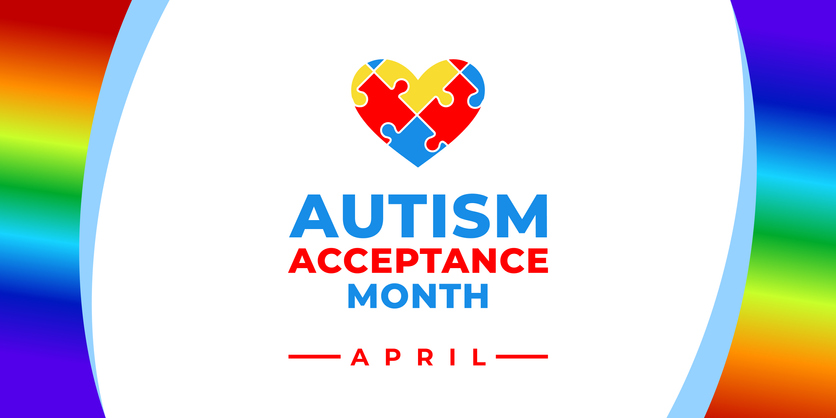New Baylor Initiative Promotes Ministry With and By People With Disabilities

Contact: Kelly Craine, Baylor University Media and Public Relations, 254-297-9065
Follow us on Twitter: @BaylorUMedia
WACO, Texas (April 25, 2023) – Autism Acceptance Month celebrates and encourages the acceptance of people on the autism spectrum and recognizes that they are valued members of society. Moving beyond mere awareness, the primary focus is on building an inclusive community where autistic individuals are embraced and supported to thrive in all aspects of their lives, including in their faith and friendships.
Erik W. Carter, Ph.D., the Luther Sweet Endowed Chair in Disabilities in the Baylor University School of Education and executive director of the Baylor Center for Developmental Disabilities (BCDD), is helping launch a new initiative to support churches in creating more welcoming and accessible experiences for people with autism.
“We are excited to help churches widen their welcome so that people with disabilities and their families have opportunities to participate fully and meaningfully in the life of their church,” Carter said.
Although each church will have a somewhat different starting point, it is important that congregations are proactive and intentional about reflecting on their practices and postures.
“Autistic people are indispensable members of the Body. Like anyone else, their gifts and friendship are needed within our faith communities,” Carter said. “Sometimes, however, where or how we gather can inadvertently exclude people. We should instead adopt attitudes and actions that lead to greater inclusion and belonging.”
Carter recommends that churches:
- Recognize that one in five people residing in your community experience some type of disability. One in 36 children are autistic. Be ready to welcome and support their presence before they ever arrive.
- Identify barriers that might keep people from participating in worship services, religious education, service activities, and fellowship events. Gather a team to reflect on your current practices and implement needed changes.
- Ask people about the supports and opportunities that will enable their full participation. Avoid assumptions and embrace a posture of gracious flexibility.
- Affirm that every person is made in the image of God and of immeasurable value.
- Educate staff, ministry leaders, and volunteers about autism and the ways your faith community can demonstrate hospitality and support.
- Commit to encouraging inclusion in all aspects of the church. For example, autistic children often benefit having adapted activities, sensory supports, or buddy systems.
- Prioritize relationships over programs. Encourage connections between Sundays so that new friendships can develop and deepen.
- Find ways that people with disabilities can share their gifts and serve others through the church.
As part of Baylor University’s new interdisciplinary initiative on disability, faith and flourishing in the BCDD, Carter and his colleagues will be offering training for ministry leaders, creating practical resources for churches, and developing new ministry partnerships.
“We are eager to collaborate with churches across the country to learn together what it looks like to do this work well and faithfully,” Carter said. “The scriptures are clear that we are to be lavish with our invitations and our love. Indeed, our faith communities are incomplete without people with disabilities and their families.”
ABOUT THE AUTHOR
Erik Carter, Ph.D., is The Luther Sweet Endowed Chair in Disabilities in the Baylor School of Education. His research and writing focus on principle-driven and research-based strategies for promoting full participation, relationships and valued roles for children and adults with intellectual and developmental disabilities. He serves as executive director of the Baylor Center for Developmental Disabilities, which aims to promote the thriving of people with disabilities and their families. He joined the Baylor faculty in 2023, after serving as The Cornelius Vanderbilt Chair in Special Education at Vanderbilt University and co-director of the Vanderbilt Kennedy Center for Excellence in Developmental Disabilities.
Carter has co-authored seven books and more than 300 journal articles, chapters and other publications. His scholarship and advocacy have also been recognized with awards from All Belong, the American Association on Intellectual and Developmental Disabilities, the Association of University Centers on Disability and the Council for Exceptional Children.
At Baylor, he is collaborating to launch a new initiative aimed at advancing empirical and theological scholarship focused on disability, faith and flourishing.
ABOUT BAYLOR UNIVERSITY
Baylor University is a private Christian University and a nationally ranked Research 1 institution. The University provides a vibrant campus community for more than 20,000 students by blending interdisciplinary research with an international reputation for educational excellence and a faculty commitment to teaching and scholarship. Chartered in 1845 by the Republic of Texas through the efforts of Baptist pioneers, Baylor is the oldest continually operating University in Texas. Located in Waco, Baylor welcomes students from all 50 states and more than 100 countries to study a broad range of degrees among its 12 nationally recognized academic divisions.
ABOUT BAYLOR SCHOOL OF EDUCATION
For more than 100 years, the School of Education has advanced Baylor’s mission across the globe while preparing students for a range of careers focused on education, leadership, and human development. With more than 60 full-time faculty members, the school’s growing research portfolio complements its long-standing commitment to excellence in teaching and student mentoring. Baylor’s undergraduate program in teacher education has earned national distinction for innovative partnerships with local schools that provide future teachers deep clinical preparation. Likewise, the School of Education’s graduate programs have attained national recognition for their exemplary preparation of research scholars, educational leaders, innovators, and clinicians. Visit the School of Education website to learn more.